小学语法---形容词和副词
- 格式:doc
- 大小:84.00 KB
- 文档页数:12
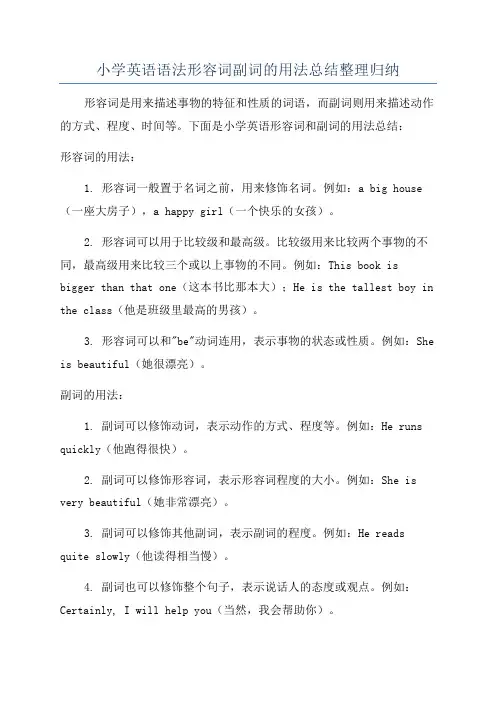
小学英语语法形容词副词的用法总结整理归纳形容词是用来描述事物的特征和性质的词语,而副词则用来描述动作的方式、程度、时间等。
下面是小学英语形容词和副词的用法总结:形容词的用法:1. 形容词一般置于名词之前,用来修饰名词。
例如:a big house (一座大房子),a happy girl(一个快乐的女孩)。
2. 形容词可以用于比较级和最高级。
比较级用来比较两个事物的不同,最高级用来比较三个或以上事物的不同。
例如:This book is bigger than that one(这本书比那本大);He is the tallest boy in the class(他是班级里最高的男孩)。
3. 形容词可以和"be"动词连用,表示事物的状态或性质。
例如:She is beautiful(她很漂亮)。
副词的用法:1. 副词可以修饰动词,表示动作的方式、程度等。
例如:He runs quickly(他跑得很快)。
2. 副词可以修饰形容词,表示形容词程度的大小。
例如:She is very beautiful(她非常漂亮)。
3. 副词可以修饰其他副词,表示副词的程度。
例如:He reads quite slowly(他读得相当慢)。
4. 副词也可以修饰整个句子,表示说话人的态度或观点。
例如:Certainly, I will help you(当然,我会帮助你)。
需要注意的是,有一些形容词和副词的形式是相同的,需要根据具体情况来判断其词性。
同时,有些形容词和副词可以通过在词尾加上"-ly"来转化为副词形式。

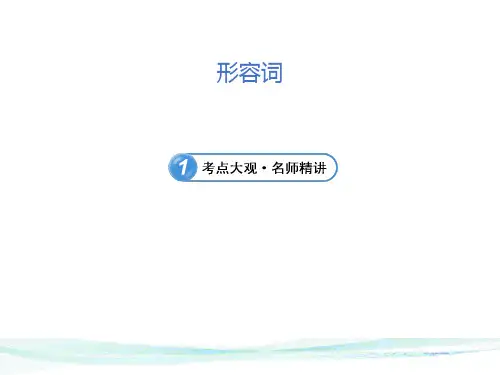
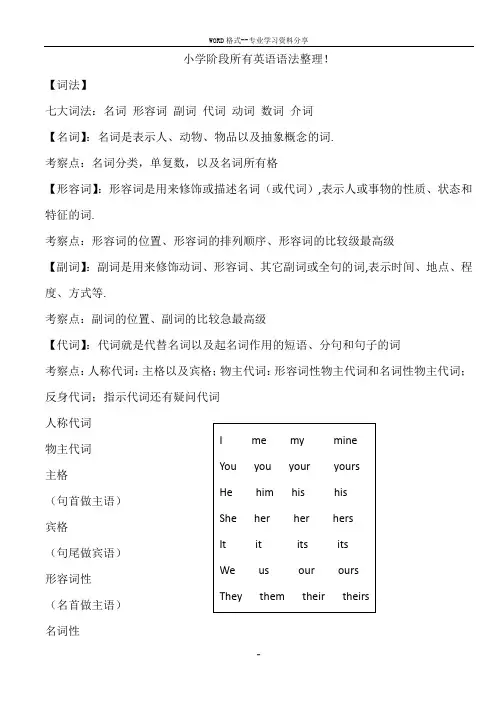
小学阶段所有英语语法整理!【词法】七大词法:名词形容词副词代词动词数词介词【名词】:名词是表示人、动物、物品以及抽象概念的词.考察点:名词分类,单复数,以及名词所有格【形容词】:形容词是用来修饰或描述名词(或代词),表示人或事物的性质、状态和特征的词.考察点:形容词的位置、形容词的排列顺序、形容词的比较级最高级【副词】:副词是用来修饰动词、形容词、其它副词或全句的词,表示时间、地点、程度、方式等.考察点:副词的位置、副词的比较急最高级【代词】:代词就是代替名词以及起名词作用的短语、分句和句子的词考察点:人称代词:主格以及宾格;物主代词:形容词性物主代词和名词性物主代词;反身代词;指示代词还有疑问代词人称代词主格(句首做主语)宾格(句尾做宾语)形容词性(名首做主语)名词性(句尾做宾语)【动词】:表示动作或状态的词叫做动词考察点:Be动词的用法、动词的变化规则、动词的分类Be 动词的用法:(1) Am--was Is --was Are--were 口诀:我用am, 你用are, is用在他她它,复数全用are。
(2) 肯定和否定句:I am (not) from London.My hair is (not) long.He is (not) a teacher.She is (not) in the dining room.Her eyes are (not) small.(3) 一般疑问句:Am I a Chinese? Yes, you are. No, you aren’t.Are they American? Yes, they are. No, they aren’t.Is the cat fat? Yes, it is. No, it isn’t.动词s的变化规则:1.一般情况下,直接加-s,如:cook-cooks, milk-milks2.以s. x. sh. ch. o结尾,加-es,如:guess-guesses, wash-washes, watch-watches, go-goes 3.以“辅音字母y”结尾,变y为i, 再加-es,如:study-studies动词加ing的变化规则:1.一般情况下,直接加ing,如:cook-cooking2.以不发音的e结尾,去e加ing,如:make-making, taste-tasting3.假如末尾是一个元音字母和一个辅音字母,双写末尾的辅音字母,再加ing,如:run-running, stop-stopping动词过去式变化规则:1.一般在动词末尾加-ed,如:work-worked , cook-cooked2.结尾是e加d,如:live-lived3.末尾只有一个元音字母和一个辅音字母的重读闭音节,应双写末尾的辅音字母,再加-ed如:stop-stopped4.以“辅音字母y”结尾的,变y为i,再加-ed,如:study-studied5.不规则动词过去式:am,is-was, are-were, do-did, see-saw, say-said, give-gave, get-got, go-went,come-came, have-had, eat-ate, take-took, run-ran, sing- sang, put-put,read-read, write-wrote, draw-drew, drink-drank, swim-swam, sit-sat【数词】:数词是表示数目多少或顺序先后的词.数词分为基数词和序数词.考察点:基数词、序数词(1)基数词:表示数目多少的数词叫做基数词.从1—10的基数词one,two,three,four,five,six,seven,eight,nine,ten.(2)序数词:表示顺序的数词叫做序数词.第1 first 1st 第2 second 2nd 第3 third 3rd第4 fourth 4th 第5 fifth 5th 第6sixth 6th第7 seventh 7th 第8 eighth 8th 第9 ninth 9th第10 tenth 10th【介词】:介词通常四用来表示它后面的名词(代词)或起名词作用的短语、从句与句中其它成分之间的关系.考察点:介词的分类及用法常见介词:(1)时间介词:at、in、on、before、after和from.(2)方位介词:on、in、at、under和behind等.(3)动向介词:into、out of、up、down、from、to、through和along (4)表示方式、手段的介词:by、with和in.(5)其它介词:for、about、with、in、of、like.【量词】:通常用来表示人、事物或动作的数量单位的词,叫做量词。
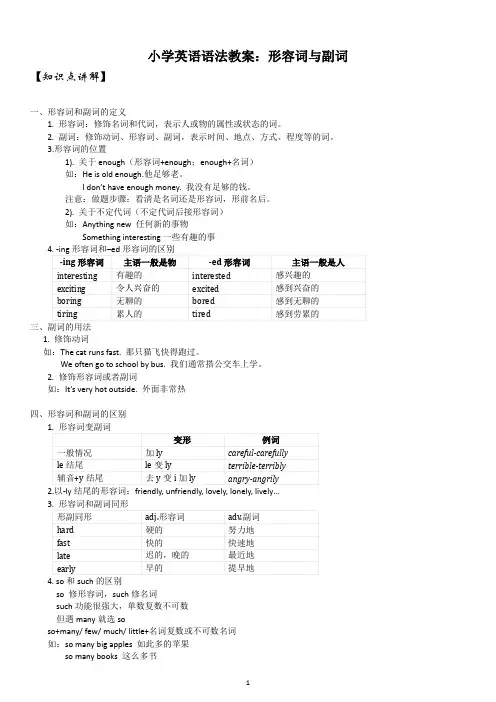
小学英语语法教案:形容词与副词【知识点讲解】一、形容词和副词的定义1. 形容词:修饰名词和代词,表示人或物的属性或状态的词。
2. 副词:修饰动词、形容词、副词,表示时间、地点、方式、程度等的词。
3.形容词的位置1). 关于enough(形容词+enough;enough+名词)如:He is old enough.他足够老。
I don’t have enough money. 我没有足够的钱。
注意:做题步骤:看清是名词还是形容词,形前名后。
2). 关于不定代词(不定代词后接形容词)如:Anything new 任何新的事物Something interesting一些有趣的事三、副词的用法1. 修饰动词如:The cat runs fast. 那只猫飞快得跑过。
We often go to school by bus. 我们通常搭公交车上学。
2. 修饰形容词或者副词如:It’s very hot outside. 外面非常热四、形容词和副词的区别2.以-ly结尾的形容词:friendly, unfriendly, lovely, lonely, lively…4. so和such的区别so 修形容词,such修名词such功能很强大,单数复数不可数但遇many就选soso+many/ few/ much/ little+名词复数或不可数名词如:so many big apples 如此多的苹果so many books 这么多书so few people 这么少的人so much money 那么多的钱so little milk 那么少的牛奶五、形容词副词的原级、比较级和最高级六、形容词副词的原级、比较级和最高级用法1. 原级形容词的本来形式就是形容词的原级。
1). “as…as”结构,表示“前者像后者一样”,A+do+as+adj./ adv. +as+B (+do).如:John is as tall as his brother. 约翰和他的哥哥一样高。
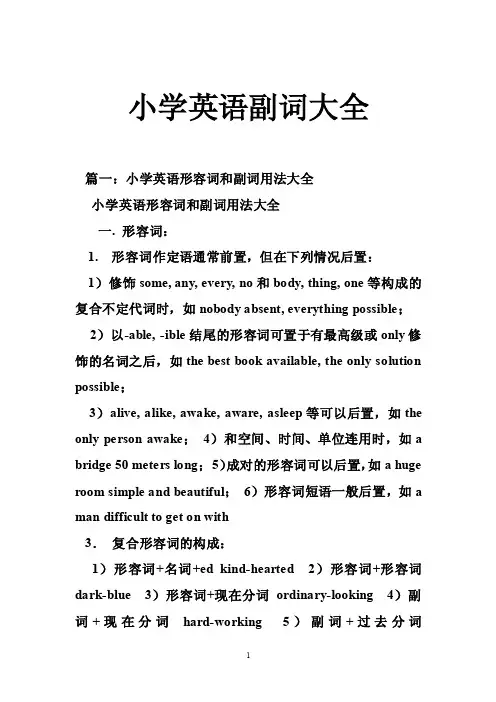
小学英语副词大全篇一:小学英语形容词和副词用法大全小学英语形容词和副词用法大全一. 形容词:1. 形容词作定语通常前置,但在下列情况后置:1)修饰some, any, every, no和body, thing, one等构成的复合不定代词时,如nobody absent, everything possible;2)以-able, -ible结尾的形容词可置于有最高级或only修饰的名词之后,如the best book available, the only solution possible;3)alive, alike, awake, aware, asleep等可以后置,如the only person awake;4)和空间、时间、单位连用时,如a bridge 50 meters long;5)成对的形容词可以后置,如a huge room simple and beautiful;6)形容词短语一般后置,如a man difficult to get on with3.复合形容词的构成:1)形容词+名词+ed kind-hearted 2)形容词+形容词dark-blue 3)形容词+现在分词ordinary-looking 4)副词+现在分词hard-working 5)副词+过去分词newly-built 6)名词+形容词world-famous 7)名词+现在分词peace-loving 8)名词+过去分词snow-covered 9)数词+名词+ed three-egged 10)数词+名词twenty-year 二. 副词副词的分类:1 时间副词soon, now, early, finally, once, recently2 地点副词here, nearby, outside, upwards, above3 方式副词hard, well, fast, slowly, excitedly, really4 程度副词almost, nearly, very, fairly, quite, rather5 频度副词always, often, frequently, seldom, never6 疑问副词how, where, when, why7 连接副词how, when, where, why, whether, however, meanwhile 8 关系副词when, where, why 三. 形容词和副词比较等级:形容词和副词的比较等级分为原级,比较级和最高级。
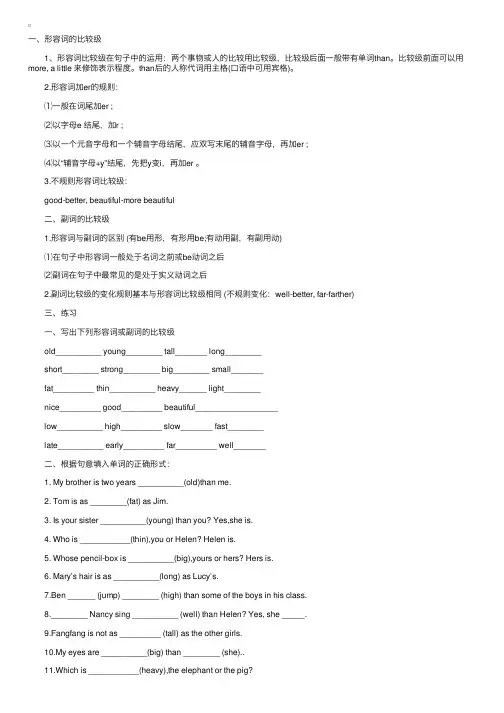
⼀、形容词的⽐较级 1、形容词⽐较级在句⼦中的运⽤:两个事物或⼈的⽐较⽤⽐较级,⽐较级后⾯⼀般带有单词than。
⽐较级前⾯可以⽤more, a little 来修饰表⽰程度。
than后的⼈称代词⽤主格(⼝语中可⽤宾格)。
2.形容词加er的规则: ⑴⼀般在词尾加er ; ⑵以字母e 结尾,加r ; ⑶以⼀个元⾳字母和⼀个辅⾳字母结尾,应双写末尾的辅⾳字母,再加er ; ⑷以“辅⾳字母+y”结尾,先把y变i,再加er 。
3.不规则形容词⽐较级: good-better, beautiful-more beautiful ⼆、副词的⽐较级 1.形容词与副词的区别 (有be⽤形,有形⽤be;有动⽤副,有副⽤动) ⑴在句⼦中形容词⼀般处于名词之前或be动词之后 ⑵副词在句⼦中最常见的是处于实义动词之后 2.副词⽐较级的变化规则基本与形容词⽐较级相同 (不规则变化:well-better, far-farther) 三、练习 ⼀、写出下列形容词或副词的⽐较级 old__________ young________ tall_______ long________ short________ strong________ big________ small_______ fat_________ thin__________ heavy______ light________ nice_________ good_________ beautiful__________________ low__________ high_________ slow_______ fast________ late__________ early_________ far_________ well_______ ⼆、根据句意填⼊单词的正确形式: 1. My brother is two years __________(old)than me. 2. Tom is as ________(fat) as Jim. 3. Is your sister __________(young) than you? Yes,she is. 4. Who is ___________(thin),you or Helen? Helen is. 5. Whose pencil-box is __________(big),yours or hers? Hers is. 6. Mary’s hair is as __________(long) as Lucy’s. 7.Ben ______ (jump) ________ (high) than some of the boys in his class. 8.________ Nancy sing __________ (well) than Helen? Yes, she _____. 9.Fangfang is not as _________ (tall) as the other girls. 10.My eyes are __________(big) than ________ (she).. 11.Which is ___________(heavy),the elephant or the pig? 12.Who gets up _________(early),Tim or Tom? 13._____the girls get up_______(early) than the boys?No,they______. 14. Jim runs _____(slow). But Ben runs _____(slow). 15.The child doesn’t______(write) as ____(fast) as the students. 三、翻译句⼦: 1、谁⽐Jim年纪⼤?是你。
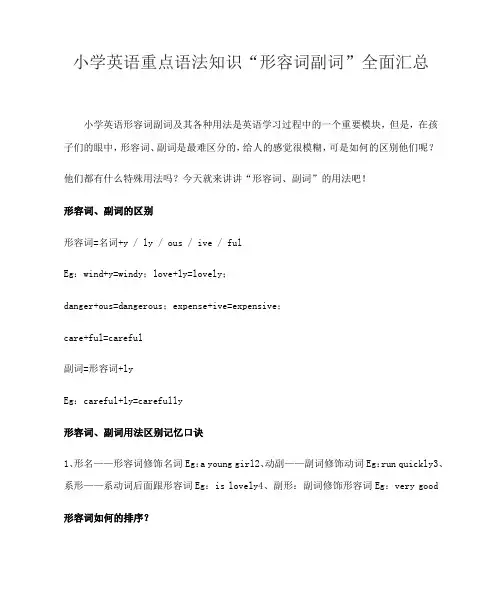
小学英语重点语法知识“形容词副词”全面汇总
小学英语形容词副词及其各种用法是英语学习过程中的一个重要模块,但是,在孩子们的眼中,形容词、副词是最难区分的,给人的感觉很模糊,可是如何的区别他们呢?他们都有什么特殊用法吗?今天就来讲讲“形容词、副词”的用法吧!
形容词、副词的区别
形容词=名词+y / ly / ous / ive / ful
Eg:wind+y=windy;love+ly=lovely;
danger+ous=dangerous;expense+ive=expensive;
care+ful=careful
副词=形容词+ly
Eg:careful+ly=carefully
形容词、副词用法区别记忆口诀
1、形名——形容词修饰名词Eg:a young girl
2、动副——副词修饰动词Eg:run quickly
3、系形——系动词后面跟形容词Eg:is lovely
4、副形:副词修饰形容词Eg:very good 形容词如何的排序?。
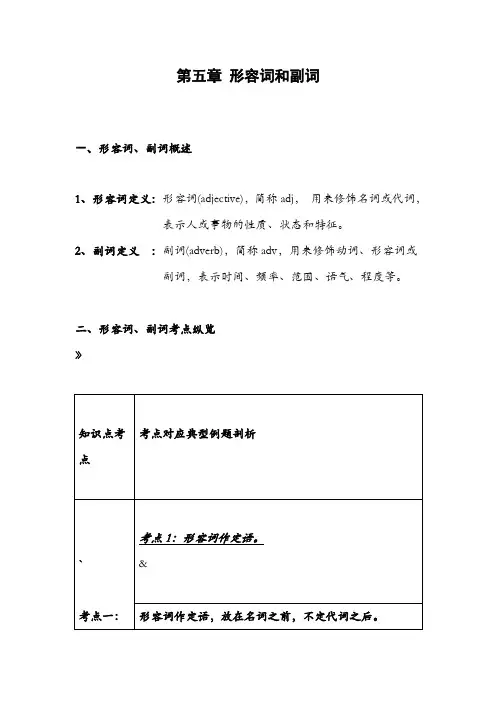
第五章形容词和副词一、形容词、副词概述1、形容词定义:形容词(adjective),简称adj,用来修饰名词或代词,表示人或事物的性质、状态和特征。
2、副词定义:副词(adverb),简称adv,用来修饰动词、形容词或副词,表示时间、频率、范围、语气、程度等。
二、形容词、副词考点纵览》)三、综合练习( ) 1. How beautifully she sings! I have never heard _____ voice.A. a betterB. a bestC. the betterD. the best ( ) 2. She looks very _____ but I can’t remember her name.A. similarB. familiarC. friendlyD. strange ( ) 3. Children all looked _____ at the broken model plane and felt quite _____.}A. sad; sadB. sadly; sadlyC. sad; sadlyD. sadly;sad( ) 4. The child dreamed that he had once lived in a _______ house in the forest.A. wooden pretty littleB. little pretty woodenC. pretty little woodenD. wooden little pretty( ) 5. ---Which team is _______ to win the game---I don’t know, but I’ve found _______ for ours to win.A. probable; it unlikelyB. likely; it possibleC. possible; it possibleD. likely; it possibly,( ) 6. With the development of the Internet, _______ communication is done by regular mail.A. lessB. moreC. littleD. few ( ) 7. ---If you don’t like the red coat, take the blue one.---OK, but do you have ______ size in blue This one’s a bit tight for me.A. a bigB. a biggerC. the bigD. the bigger ( ) 8. If there were no examinations, we should have ______ at school.A. the happiest timeB. a more happier timeC. much happiest timeD. a much happier time~( ) 9. This dress is prettier, but it costs ______ that one.A. twice more thanB. twice as much asC. as much twice asD. twice so much as( ) are required to take part in the boat race.A. Ten strong young ChineseB. Ten Chinese strong youngC. Chinese ten young strongD. Young strong ten Chinese ( ) 11. Allen had to call a taxi because the box was ____to carry all the way home.A. much too heavyB. too much heavy`C. heavy too muchD. too heavy much( ) 12. Our neighbor has ________ours.A. as a big house asB. as big a house asC. the same big house asD. a house the same big as ( ) 13. We were in ________when we left that we forgot the airline tickets.A. a rush so anxiousB. a such anxious rushC. so an anxious rushD. such an anxious rush( ) 14. ---I was riding along the street and all of a sudden, a car cut in and knocked me down./---You can never be ________careful in the street.A. muchB. veryC. soD. too( ) 15. ---You don’t look very ________.Are you ill---No,I’m just a bit tired.A. goodB. wellC. strongD. healthy ( ) 16. Four of Robert’s children were at the party,including ________, Luke.A. the eldestB. an oldest oneC. the oldD. an old one( ) 17. Many students signed up for the ________race in the sports meeting to be held next week.]A. 800-metre-longB. 800-metres-longC. 800 metre lengthD. 800 metres length( ) 18. It’s always difficult being in a foreign country,________if you don’t speak the language.A. extremelyB. naturallyC. basicallyD. especially( ) 19. In recent years,travel companies have succeeded in selling us the idea that the further we go,__________.A. our holiday will be betterB. our holiday will be the betterC. the better our holiday will beD. the better will our holiday be ( )20. When he heard a cry for help, he ran out as ________ as he could.A. hardlyB. quicklyC. finallyD. slowly )( ) 21. “Our team is _____ to win the match.” “Really But I don’t th ink so.”A. easyB. difficultC. possibleD. sure ( ) 22. A ______ road goes ______ from one place to another.A. straight; straightB. straightly; straightlyC. straight; straightlyD. straightly; straight( ) 23. “This book is ______ more useful for us students.” “Yes, but it is _______ too difficult.”A. quite; quiteB. much; ratherC. rather; quiteD. quite; much( ) 24. There was a ______ change in the weather, and the rain came pouring down.%A. quickB. slowC. fastD. sudden ( ) 25. You can speak ______ in front of him, but you can’t eat ______ in his restaurant.A. freely; freelyB. free; freelyC. freely; freeD. free; free( ) 26. Tom will n ot be at the picnic, ______ to the family’s disappointment.A. muchB. moreC. too muchD. much more( ) 27. --- I have seen so little of Mike ______. Is he away on business --- Oh, no. He just leaves for his office early and comes back very ______.A. later; latelyB. later; laterC. lately; lateD. late; lately( ) 28. From his ______ voice on the phone I know everything is well under way.A. satisfactoryB. satisfyingC. satisfiedD. satisfaction( ) 29. In ______ Chinese culture, marriage decisions were often made by parents for their children.A. traditionalB. historicC. peacefulD. civil ( ) 30. The houses in the village are ______ built of wood and hay.A. mostB. almostC. nearlyD. mostly( ) 31. --- What do people wear when they go to the theatre--- Well, it isn’t very ______. People can wear anything they like.A. normalB. certainC. modernD. simple ( ) 32. Mary’s biology is ______ than ______ in the class.A. a lot of better; anyone else’sB. far better; anyone’s else’sC. much better; anyone elseD. a lot better; anyone else’s ( ) 33. We decided not to climb the mountains because it was raining____.A. badlyB. hardlyC. stronglyD. heavily ( ) 34. Paris is one of _____ cities in the world.A. more beautifullyB. more beautifulC. the most beautifullyD. the most beautiful( ) 35. Are you going to leave______A. the open windowsB. the windows openingC. the windows openD. the windows opened( ) 36. Bob never does his homework _____ Mary, so he makes lots of mistakes.A. so careful asB. as carefully asC. carefully asD. as careful as.( ) 37. My sister is good at sports. She can jump ____ than me.A. highestB. very highC. too highD. much higher( ) 38. When spring comes, the trees get ____.A. green and greenB. green and greenerC. greener and greenD. greener and greener( ) works very _____________has a rest on Sundays.A. hard; hardlyB. hardly; hardC. hard; hardD. hardly; hardly( ) learns Russian_____________.A. goodB. niceC. wellD. fine( ) boy didn’t run______________ to catch the bus.A. fast enoughB. enough fastC. quick enoughD. enough quickly( ) _____________ is bad for our health.A. much tooB. too muchC. too moreD. too many( ) you ever seen ______________ big panda beforeA. a suchB. such aC. so aD. as ( ) looks very _____________ today.A. worriedB. worryC. worryingD. to worry( ) to me. I have _____________ to tell you.A. important somethingB. important anythingC. something importantD. anything important ( ) 46. ---How ___ can you finish the drawing--- In ten minutes.A. longB. often.C. soonD. rapid ( ) 47. This book is _____ worth seeing again.A. veryB. quiteC. wellD. much ( ) 48. My _____ brother is three years ____ than I .A. old; olderB. elder; olderC. older; elderD. old; elder( ) 49. We felt ___ after we watched the ___ football match.A. exciting; excitedB. excited; excitingC. excited; excitedD. exciting; exciting( ) 50. The old man lived ____ in the house, but he didn’t feel___.A. lonely; lonelyB. alone; lonelyC. alone; aloneD. lonely; alone参考答案1. A11. A21. D31. B41. A。
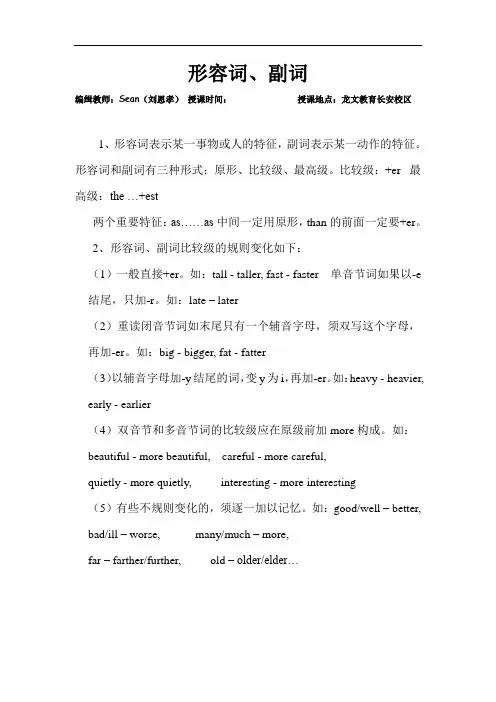
形容词、副词编缉教师:Sean(刘恩孝)授课时间:授课地点:龙文教育长安校区1、形容词表示某一事物或人的特征,副词表示某一动作的特征。
形容词和副词有三种形式:原形、比较级、最高级。
比较级:+er 最高级:the …+est两个重要特征:as……as中间一定用原形,than的前面一定要+er。
2、形容词、副词比较级的规则变化如下:(1)一般直接+er。
如:tall - taller, fast - faster 单音节词如果以-e 结尾,只加-r。
如:late – later(2)重读闭音节词如末尾只有一个辅音字母,须双写这个字母,再加-er。
如:big - bigger, fat - fatter(3)以辅音字母加-y结尾的词,变y为i,再加-er。
如:heavy - heavier, early - earlier(4)双音节和多音节词的比较级应在原级前加more构成。
如:beautiful - more beautiful, careful - more careful,quietly - more quietly, interesting - more interesting(5)有些不规则变化的,须逐一加以记忆。
如:good/well – better, bad/ill – worse, many/much – more,far – farther/further, old –older/elder…形容词、副词练一练:全卷满分:拟题人:Sean(刘恩孝)拟题时间:1、写出下列形容词、副词的比较级。
big good longtall old short t hin heavy youngfat light stronghigh far lowearly late wellfast slow2、用括号内所给单词的适当形式填空。
1) I can swim as _______ ( fast ) as the fish, I think.2) Look! His hands are _______ ( big ) than mine.3) I think you do these things_______ ( well ) than your classmates.4) Whose bag is _______ ( heavy ), yours or mine?5) Does Jim run as _______(slow ) as David? Yes, but Mikeruns_______ ( slow ) than them.6) You have seven books, but I have _______ ( many ) than you.I have ten.7) I jump _______ ( far ) than some of the boys in my class.8) I’m very_______ ( thin ), but she’s _______ ( thin ) than me.9) It gets _______and_______ ( warm ) when spring comes here.。
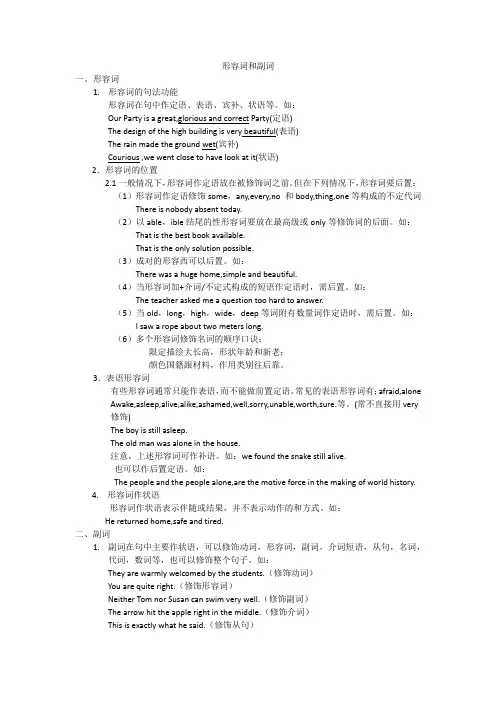
形容词和副词一、形容词1.形容词的句法功能形容词在句中作定语、表语、宾补、状语等。
如:Our Party is a great,glorious and correct Party(定语)The design of the high building is very beautiful(表语)The rain made the ground wet(宾补)Courious ,we went close to have look at it(状语)2.形容词的位置2.1一般情况下,形容词作定语放在被修饰词之前。
但在下列情况下,形容词要后置:(1)形容词作定语修饰some,any,every,no 和body,thing,one等构成的不定代词There is nobody absent today.(2)以able,ible结尾的性形容词要放在最高级或only等修饰词的后面。
如:That is the best book available.That is the only solution possible.(3)成对的形容西可以后置。
如:There was a huge home,simple and beautiful.(4)当形容词加+介词/不定式构成的短语作定语时,需后置。
如:The teacher asked me a question too hard to answer.(5)当old,long,high,wide,deep等词附有数量词作定语时,需后置。
如:I saw a rope about two meters long.(6)多个形容词修饰名词的顺序口诀:限定描绘大长高,形状年龄和新老;颜色国籍跟材料,作用类别往后靠。
3.表语形容词有些形容词通常只能作表语,而不能做前置定语。
常见的表语形容词有;afraid,aloneAwake,asleep,alive,alike,ashamed,well,sorry,unable,worth,sure.等。
形容词和副词形容词和副词是英语语法中非常重要的词类,它们用于描述人、事物的特征和行为方式。
形容词主要修饰名词,而副词则修饰动词、形容词和其他副词。
在本文中,我们将探讨形容词和副词的特点、用法以及常见的例子。
一、形容词形容词是用来描述名词的词类,它可以通过在名词前面进行修饰来表达特征和性质。
形容词通常用于以下几种情况:1. 描述名词的外观和形状:beautiful(美丽的)、round(圆的)、tall(高的)等。
2. 描述名词的颜色:red(红的)、blue(蓝的)、yellow(黄的)等。
3. 描述名词的大小:big(大的)、small(小的)、huge(巨大的)等。
4. 描述名词的品质和特征:kind(善良的)、intelligent(聪明的)、brave(勇敢的)等。
5. 描述名词的情感和感觉:happy(快乐的)、sad(悲伤的)、excited(兴奋的)等。
形容词的用法要根据所修饰名词的单复数、定冠词和限定词等进行相应的变化。
例如:- The beautiful flowers filled the garden with colors.(美丽的花朵将花园装点得五彩斑斓。
)- I saw a big house on the top of the hill.(我看到一座大房子位于山顶上。
)- She is a kind and intelligent girl.(她是一个善良而聪明的女孩。
)二、副词副词用于修饰动词、形容词和其他副词,它可以表示时间、地点、方式、程度等。
副词通常用于以下几种情况:1. 描述动词的方式和动作:slowly(慢慢地)、quickly(快速地)、carefully(小心地)等。
2. 描述形容词的程度:very(非常)、quite(相当)、extremely(极其)等。
3. 描述地点和方向:here(这里)、there(那里)、upstairs(楼上)等。
4. 描述时间:today(今天)、tomorrow(明天)、soon(很快)等。
语法知识形容词与副词语法知识:形容词与副词形容词和副词是英语语法中常用的两类词性,它们在句子中起着修饰名词或动词的作用。
形容词主要用于修饰名词,描述名词的特征和性质,而副词主要用于修饰动词、形容词或其他副词,描述它们的程度、方式、时间等。
一、形容词形容词是用来描述名词的词性,它可以给出名词的属性、特征或状态。
在句子中,形容词通常位于名词之前,用来修饰名词。
1. 形容词的用法形容词可以用来表示名词的颜色、形状、大小、品质、国籍等特征。
例如:- a beautiful flower(一朵美丽的花)- a big house(一座大房子)- a red apple(一个红苹果)2. 形容词的比较级和最高级形容词可以通过在词尾加上-er来表示比较级,加上-est来表示最高级。
此外,有些形容词的比较级和最高级是不规则的,需要记忆。
例如:- tall(高)- taller(更高)- tallest(最高)- good(好)- better(更好)- best(最好)3. 形容词的位置形容词通常放在名词前面,但有时也可以放在名词后面。
例如:- a beautiful girl(一个漂亮的女孩)- a girl beautiful(一个漂亮的女孩)二、副词副词是一类用来修饰动词、形容词或其他副词的词性。
它可以表示时间、地点、方式、程度等含义。
1. 副词的用法副词可以用来修饰动词,表示动作发生的方式、频率、时间等。
例如:- He speaks slowly.(他说话慢慢地)- She always arrives on time.(她总是准时到达)副词还可用来修饰形容词,表示程度或程度的变化。
例如:- The weather is very hot today.(今天天气非常热)- She is quite tall.(她很高)2. 副词的比较级和最高级副词的比较级和最高级形式通常在词尾加上-er和-est,但也有一些不规则变化的副词。
小学英语语法之形容词和副词学校英语语法之形容词和副词形容词[adjective 简称adj.或a.] 许多语言中均有的主要词类中的一种。
主要用来修饰名词的词,表示事物的特征。
形容词用来修饰名词或代词, 表示人或事物的性质, 状态,和特征。
副词[adverb简写adv] 副词是一种用来修饰动词,形容词,全句的词,说明时间,地点,程度,方式等概念。
1) 时间和频度副词:no,then,often,alays,usually,early,today, lately, next,last,already,generally,frequently,seldom,ever,never,yet,soon,too, immediately, hardly,finally,shortly, before, ago,sometimes, yesterday.2) 地点副词:here, there, everyhere, anyhere, in, out, inside, outside, above, belo, don, back, forard, home, upstairs, donstairs, across, along, round , around, near, off, past, up, aay, on.3) 方式副词:carefully, properly, anxiously, suddenly, normally, fast, ell, calmly, politely, proudly, softly, armly4) 程度副词:much,little, very,rather,so,too,still, quite, perfectly, enough, extremely, entirely,almost, slightly.5) 疑问副词:ho, hen, here, hy.6) 关系副词:hen, here, hy.7) 连接副词:therefore,moreover,hoever,otherise,then.。
一、形容词、副词的词形区别形容词=名词+y / ly / ous / ive / fulEg:wind+y=windy;love+ly=lovely;danger+ous=dangerous;expense+ive=expensive;care+ful=careful副词=形容词+lyEg:careful+ly=carefully二、形容词、副词用法区别记忆口诀:形名动副系形副形1、形名——形容词修饰名词Eg:a young girl2、动副——副词修饰动词Eg:run quickly3、系形——系动词后面跟形容词Eg:is lovely4、副形:副词修饰形容词Eg:very good三、形容词如何的排序?有一个房间,有很多的修饰限定词,如何给它们排序?按照如下顺序:美丑-大小-形状-新旧-颜色-国籍-材质-用途记忆口诀:美小圆旧黄,法国木书房A beautiful small round old yellow French wooden study room四、形副同形词有哪些?1、Well形容词性意思:身体好的副词性意思:好地2、Fast形容词性意思:快的副词性意思:快地3、Early形容词性意思:早的副词性意思:早早地4、Hard形容词性意思:难的,硬的副词性意思:勤奋地衍生词:Hardly 几乎不5、Late形容词性意思:晚的副词性意思:晚地衍生词:Lately 最近6、Near形容词性意思:近的副词性意思:近地衍生词:Nearly 几乎7、High形容词性意思:高的副词性意思:高地衍生词:Highly 高度地五、比较级和最高级词的比较级和最高级变化规则。
腾飞辅导中心小学英语语法(第22期)第三讲形容词和副词Name Mark★重点讲解一、形容词:形容词是用来修饰物体的形状、大小、长度、属性、特点的词。
1.一般位于名词前,做“ 前置定语” 。
I have a busy day. 我忙了一天。
She is a famous scientist.2.放在be动词的后面,被称为“ 系表结构” 。
如:He is clever. She is beautiful.3.当几个形容词或形容词和名词同时修饰一个名词时,必须按照正确的排列顺序,即:大小--- 形状--- 颜色--- 质地。
如:a big yellow banana a white round stone bench4.表示国籍的几个形容词,还可以用作名词,但意义上有所区别。
如:a Chinese /Japanese boy speak Chinese / Japanese5.形容词修饰不定代词something, anything等时,需要置于其后。
如:I have something important to tell you.There is something wrong with you.二、副词:是说明时间、地点、程度、方式等概念的词。
1.副词的分类时间副词如:now, usually, often, always, sometime, yesterday等。
地点副词如:here, there, everywhere等。
(其前不能加介词,如:go there / come here)方式副词如:quiet ly, slow ly,quick ly, careful ly等。
(““怎样地” )程度副词如:very, much, quite(完全地,十分地), too(太)等。
2.副词的用法:主要用来修饰动词的。
如:He play s basketball well.He jump s high.三、形容词、副词的等级:原级、比较级和最高级。
知识要点:一.形容词、副词的概念形容词:我们把用来修饰名词、代词的词称为形容词。
形容词主要描述人或者事物的性质、特征和状态。
副词:说明事情发生的时间、地点、原因、方式、等含义的词,我们称之为副词。
多用来修饰动词或整个句子。
二.形容词、副词的用法1.形容词一般在句中作定语,放在名词或代词前面,都含有“……的”意思。
如:a nice watch 一只漂亮的手表an empty box 一个空箱子a clever boy 一个聪明的男孩 a beautiful girl 一个美丽的女孩delicious food 可口的食物an interesting book 一本有趣的书a blue car 一辆蓝色的小汽车an exciting speech 一次令人兴奋的演讲注意:形容词在修饰someone, somebody, something, anyone, anybody, anything, nobody, nothing 等不定代词时,需要置于其后。
如:something important (重要的事情) nothing interesting (没有什么有趣的)2.形容词作表语(有些形容词只能作表语,放在系动词之后)These flowers are blue. 这些花是蓝色的。
Bob looks smart today. 今天鲍勃看上去很精神。
有些形容词只能作表语,放在系动词之后, 如:asleep / alike / ill 等The boy is asleep.Lucy and Lily look alike.Her mother is ill.3.形容词做宾语补足语,放在宾语之后(常用动词有make / paint / keep / find / want / like等后接名词或代词作宾语,再接形容词做宾语补足语,补充说明宾语的状态、特征等。
We must keep our classroom clean.Do you like your tea weak or strong?The boy was beaten black and blue.4.形容词与表示“长、宽、高、重、老、距离”的词连用时,常放在后面。
Tom is 1.7 meters tall.My father is 30 years old.The school is 100 meters away.5.副词多用来修饰动词,可以放在句子的前面、中间、或最后。
They live happily. (happily快乐地,幸福地,修饰动词live)They are listening to the teacher carefully. (carefully 认真地,修饰动词listen) Don’t speak loudly in class. (loudly 大声地,修饰动词speak)注意:联系动词不用副词修饰,直接加形容词作表语。
联系动词有feel / smell / ge t / become / turn / sound / look等)Her face became pale. 他的脸色变得苍白。
The fish smells terrible . 这条鱼难闻极了。
The food tastes delicious. 这食物尝起来很可口。
This cloth feels soft. 这批布让人感觉很柔软。
6.部分形容词加-ly可以变成副词。
如:形容词副词quick+ly quicklyslow+ly slowlyquiet+ly quietlyhappy+ly happilycareful+ly carefully注意:并不是以ly结尾的单词都是副词,名词+ly可变成形容词。
如:名词形容词friend + ly friendly 朋友般的love + ly lovely 可爱的sister + ly sisterly 姐妹般的brother +ly brotherly 兄弟般的father + ly fatherly 父亲般的mother + ly motherly 母亲般的有些名词+y可以变成形容词。
如:名词形容词rain + y rainy 下雨的snow + y snowy 下雪的cloud + y cloudy 阴天的salt + y salty 咸的sand + y sandy 有沙的fog + y foggy 雾的wind + y windy 有风的三.形容词、副词的比较级和最高级的构成规则大多数形容词、副词都有等级的变化,表示“比……更……”或“最……”。
形容词用来表示物的等级差别一般有原级、比较级和最高级三种形式。
如:tall------taller------tallest ; little------less-------least ; fast-----faster------fastest1.一般情况下,直接在原词后加-er,或加-est如:quick------quicker-------quickest slow------slower------slowestclever------cleverer------cleverest high------higher------highestlow------lower------lowest fast------faster------fastest2.以不发音的e结尾的单音节词,比较级在原词后加-r,最高级在原词后加-st如:nice------nicer------nicest large------larger------largestwhite------whiter------whitest safe------safer------safest3.以辅音字母加y结尾的双音节词,变y为i, 再加-er或-est.如:heavy------heavier------heaviest easy------easier------easiestearly------earlier------ealiest happy------happier------happiest4.重读闭音节结尾的形容词或副词,要双写末尾的辅音字母,再加-er或-est如:fat------fatter------fattest red------redder------reddestthin------thinner------thinnest wet------wetter------wettestbig------bigger------biggest hot------hotter------hottest5.部分双音节或多音节词要在原词前面加more或most.如:beautiful------more beautiful------most beautifuluseful------more useful------most usefuldelicious------more delicious------most deliciousdefferent------more different------most differentdifficult------more difficult------most difficultcarefully------more carefully------most carefully不规则变化:good/well------better------best bad------worse------worstmany/much------more------most little------less------leastfar------farther------farthest (指距离的远近)far------further------furthest (表示程度上更进步)old------older------oldest (表示年纪大)old------elder------eldest (表示长幼关系)四.形容词、副词的比较级和最高级的用法1.形容词、副词的比较级经常用于两个同类的人或事物的比较,比较对象用than来连接。
基本结构是:“主语+谓语(系动词+形容词/副词比较级+than+对比成分Your jacket is longer than mine.She is cleverer than the other girls in the class.The room is smaller than the earth.The box is heavier than that one.This story is more interesting than that one.The weather in our hometown is warmer than that in Beijing.注意:much / rather / far / a bit / a little / even 这些词常用来修饰比较级。
如He is much taller than Peter.Lily is a little thinner than Lucy.My mother is far nicer than my aunt.2.形容词或副词的最高级用于三者三者以上的人或物的比较,表示人或事物在某个范围内“最……”形容词最高级前要用the,副词最高级前面的the可以省去。
如:He runs (the) fastest in his class. 他在班上跑的最快。
Yao Ming is the tallest in Chinese basketball team. 姚明在中国篮球队里最高。
注意:as……as表示同级比较,两个as中间用原级Lily is as tall as Lucy.Lesson One is as interesting as Lesson Two. 第二课和第一课一样有趣。
not as/so……as表示否定,表示前者不如后者(so…as不能用于肯定)Mike is not as clever as Tom. 麦克不如汤姆聪明。
He is not so tall as his sister. 他没有姐姐长得高。
注意:1.“one of the + 最高级+名词(复数)”整个短语为单数形式,谓语动词要用单数。
如:One of the cleverest students in China will visit our school.2.“比较级+and+比较级”“表示越来越…”如:He works harder and harder.3. more + 形容词、副词表示前者比后者更……less + 形容词、副词表示前者不如后者……4.the + 比较级+…;the + 比较级+ …表示越…就越…如:The earlier you come, the more you get. 来得越早,收获越多。